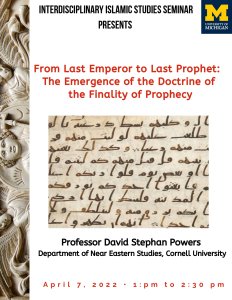Presented By: Global Islamic Studies Center
IISS Lecture Series. From Last Emperor to Last Prophet: The Emergence of the Doctrine of the Finality of Prophecy
David Stephan Powers, professor of Near Eastern Studies, Cornell University

Interdisciplinary Islamic Studies Seminar (IISS) is pleased to announce a lecture with Professor David Stephan Powers "From Last Emperor to Last Prophet: The Emergence of the Doctrine of the Finality of Prophecy". In his lecture Professor Powers will examine the intriguing interaction between the Qur'an, its interpretations, and some widespread Christian theological narratives of late antiquity.
Abstract:
The Islamic doctrine of the finality of prophecy is supported by a single verse in the Qur’an, v. 40 of Sūrat al-Aḥzab: “Muḥammad was not the father of any of your men but the Messenger of God and the Seal of Prophets (khātam al-nabiyyīn).” Islamic tradition teaches that this verse was revealed ca. 5 AH/626-27 CE in connection with a domestic crisis that is described in verse 37 of the same Sūra: After falling in love with the wife of his adopted son -- a man identified only as Zayd -- Muḥammad terminated the adoptive relationship so that, after Zayd had divorced his wife, he might marry her. Once Zayd had ceased to be Muḥammad’s son, Muḥammad was no longer the “father” of any “man” in the Muslim community and thus might become the “seal of prophets.” In my lecture, I will challenge the contention that this key theological doctrine was the product of a domestic crisis involving Muḥammad, his adoptive son, and the latter’s wife. Rather than focusing on a specific historical event – a domestic crisis in Medina in 5 AH – I propose to shift the scholarly gaze to the larger geo-political context. On the eve of the rise of Islam, Christian theologians were circulating a narrative that predicted the appearance of the Last Emperor, a king who would establish a divinely inspired imperium, the last earthly kingdom prior to the Second Coming of Christ and the End Time. I shall argue that this widespread Christian theological doctrine, known as the Last Emperor Legend, served as a model for what would become the Islamic doctrine of the finality of prophecy.
Register at: https://umich.zoom.us/meeting/register/tJ0tceutpzIoGtM9p-MUTk4_IVb7adZgoE5C
Abstract:
The Islamic doctrine of the finality of prophecy is supported by a single verse in the Qur’an, v. 40 of Sūrat al-Aḥzab: “Muḥammad was not the father of any of your men but the Messenger of God and the Seal of Prophets (khātam al-nabiyyīn).” Islamic tradition teaches that this verse was revealed ca. 5 AH/626-27 CE in connection with a domestic crisis that is described in verse 37 of the same Sūra: After falling in love with the wife of his adopted son -- a man identified only as Zayd -- Muḥammad terminated the adoptive relationship so that, after Zayd had divorced his wife, he might marry her. Once Zayd had ceased to be Muḥammad’s son, Muḥammad was no longer the “father” of any “man” in the Muslim community and thus might become the “seal of prophets.” In my lecture, I will challenge the contention that this key theological doctrine was the product of a domestic crisis involving Muḥammad, his adoptive son, and the latter’s wife. Rather than focusing on a specific historical event – a domestic crisis in Medina in 5 AH – I propose to shift the scholarly gaze to the larger geo-political context. On the eve of the rise of Islam, Christian theologians were circulating a narrative that predicted the appearance of the Last Emperor, a king who would establish a divinely inspired imperium, the last earthly kingdom prior to the Second Coming of Christ and the End Time. I shall argue that this widespread Christian theological doctrine, known as the Last Emperor Legend, served as a model for what would become the Islamic doctrine of the finality of prophecy.
Register at: https://umich.zoom.us/meeting/register/tJ0tceutpzIoGtM9p-MUTk4_IVb7adZgoE5C